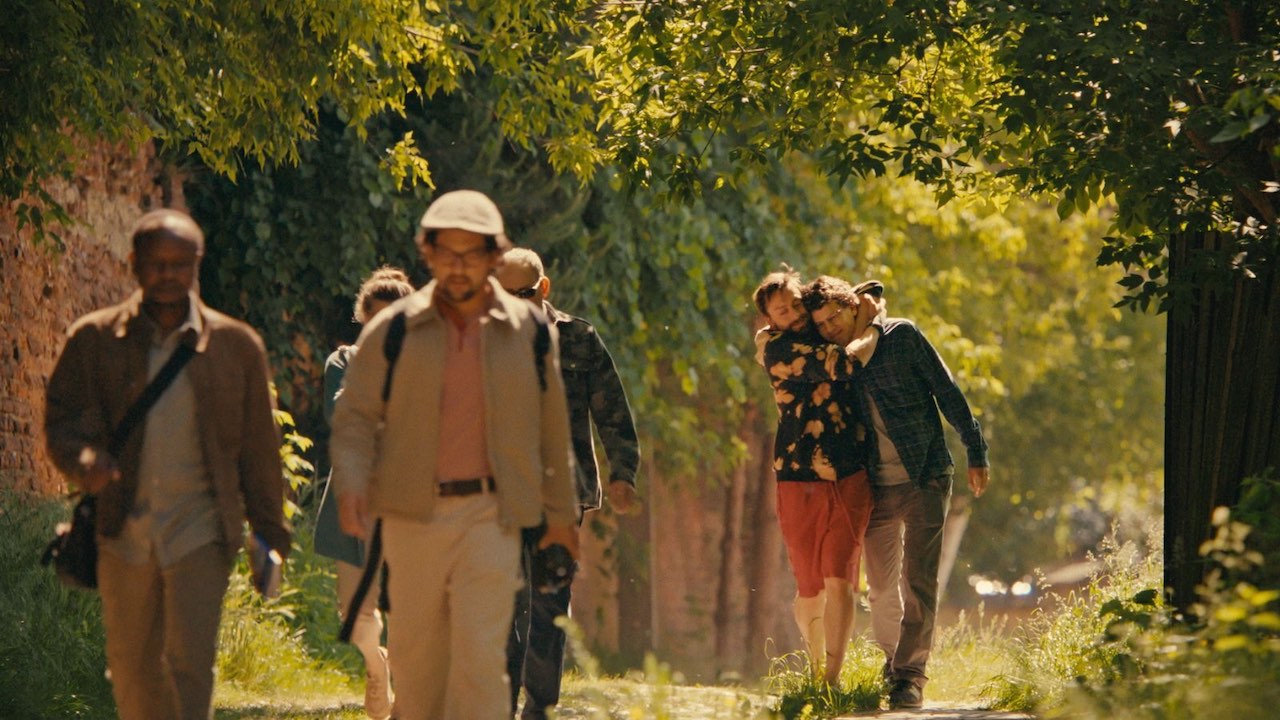“What do you have to complain about?” It’s a question often asked with caustic dismissal, never really requiring an answer. To the characters of tragicomedy A Real Pain, it’s one shouted at them from within the first-class section of a train, or while visiting a centuries-old cemetery, an admonishment of privilege and an inquiry into the absurdity of relative sadness. More than anything, though, it’s the only response they can muster to the generational horror shouting at them as they make their way from one tragic tourist trap to another.
Starring Jesse Eisenberg (who also writes and directs) and Kieran Culkin as cousins on an ill-fated pilgrimage to their grandmother’s birthplace, A Real Pain often feels like a bromantic take on Before Midnight—that is, passionate, harsh, and, at times, agonizing. When we meet Culkin’s Benjy and Eisenberg’s David, they find themselves navigating the slippery middle ground between friends and family. There’s a level of obligation (especially on David’s side) that grates against Benjy’s wiseass vulnerability and is only exacerbated as the two attempt to integrate themselves into a group embarking on, for lack of a better term, a Holocaust tour across Poland. In a way, the punchline is right there in the set-up. Though there are genuinely moving reasons behind each tour member’s journey to Poland, the very idea of a British tour guide (played by White Lotus alum Will Sharpe) leading this wayward group through the “beautiful and, yes, tragic” history of Jews in Eastern Europe is predictably taken to task by Eisenberg, who identifies the icky nature of the whole affair.
If anything, the film suffers a bit from the largely unsubtle critique it musters in this regard. So, too, from the broad characterization it provides for its most central figures. David is nervy, anxious, and a bit sullen, while Benjy is quick-talking, inappropriate, charming, and, if you can believe it, a little much. A Real Pain marks Eisenberg’s second feature, coming after the mostly unseen satire When You Finish Saving the World, but you get the sense that he still thinks like a playwright. Some of the more showy speechifying and unnatural set pieces feel more in line with the kind of cheap-seat exposition necessary in a theater setting, but do few favors here, especially for David and Benjy’s relationship.
Thankfully, this is a problem largely relegated to the film’s first half. Perhaps to reflect the type of uneasy friendships one might make within this sort of slapdash tour group, the film becomes far more subtle as things progress and Eisenberg fully settles into the themes he’s looking to explore. Much of the heavy lifting in this regard is given to Culkin, who’s more than up to the task. Benjy is a character as maddening as he is captivating, often manically shifting between the two, and it’s his uneasiness around the tour’s stated goals that most explicitly lends the film its title. Benjy, we learn, is not a particularly happy or healthy man. But how, he and others ask, could you possibly weigh his psychic pain against that of his grandmother, forced from her ancestral home to the horrors of a concentration camp, lucky to have survived at all? “I can’t stop thinking about the fact that our grandmother survived the Holocaust and he tried to kill himself with sleeping pills,” David lets slip in a harsh moment of bloodletting.
What does one have to do with the other? Everything and nothing, A Real Pain suggests. Toward the end of the film, when the cousins eventually do make it to the place their grandmother grew up, it’s not so much a moment of catharsis as it is one of fumbling sentiment. They’re there as an act of remembrance, but no matter how much they keep her in their hearts, her pain was her own and, in a way, died with her. Benjy’s pain, and to a lesser extent David’s, might feel less valid to both of them, but it remains “real” even when weighed against the unimaginable suffering of generations past. In spite of everything, even they are allowed a few complaints.







